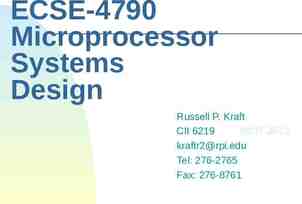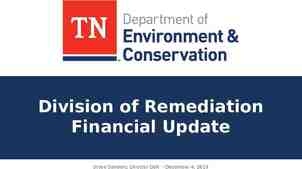Master of Arts in Counseling Student Orientation Tracks:
43 Slides1.17 MB

Master of Arts in Counseling Student Orientation Tracks: Counselor Education Rehabilitation Counseling Clinical Rehabilitation Counseling Clinical Mental Health Counseling Revised February 2022

Navigating the Slide Show For self-paced viewing of this slide show, click on the left keypad or mouse button when you are ready to go to the next slide. All slides have built-in automation to enhance the presentation of the material. Some slides have embedded hyperlinks. Hyperlinks are shown in blue, as seen at the bottom of this page. Clicking hyperlinks will take you to the additional information. You can return to the presentation by closing that window. If you have difficulty with the hyperlinks, be sure that your browser is set to allow pop-ups from ualr.edu. If you need more assistance, contact the IT Support Staff at http://ualr.edu/itservices/help/.

Purpose of Orientation Information Resource for Students Clarification of Policies and Procedures Program-Specific Information Student Responsibilities and Expectations

Fast Facts We are a part of the College of Business, Health, and Human Services (CBHHS) within UA Little Rock. Our program is located within the School of Counseling, Human Performance, and Rehabilitation (CHPR), which is located in Dickinson Hall 515 on the UA Little Rock campus. We are currently integrating new tracks in the Master of Arts in Counseling degree program. They include Clinical Mental Health Counseling, Counselor Education (School Counseling), and Clinical Rehabilitation Counseling. The traditional rehabilitation emphasis is still in place.

Faculty, Staff, and Key Personnel Dr. Shannon Collier-Tenison, CBHHS Associate Dean Dr. Jennifer Holtz, CHPR Director Dr. Ray Ortega, Program Coordinator Dr. Jason Kushner, Counselor Education Program Coordinator John Barbuto, Fieldwork Coordinator & Instructor Eureka Ice, Graduate Student Services Coordinator 501-916-6262 David Johnson, CHPR Administrative Specialist 501-916-3169 Core Faculty Dr. Jennifer Holtz Dr. Dent Gitchel, Jr. Dr. Jason Kushner Dr. Michael Jones Dr. Ray Ortega

Student Responsibilities & Expectations Students are required to communicate using their university email at all times and to check it frequently. Students are to follow the plan of study for the track they have selected. Students are expected to maintain contact with their faculty advisor. Students are expected to participate fully in each course. Students are expected to demonstrate professionalism and appropriate behavior in all settings.

Student Responsibilities & Expectations In addition to the information presented here, you should familiarize yourself with the UA Little Rock Student Handbook, UA Little Rock Graduate Student Handbook and UA Little Rock Graduate Catalog (linked on 9th slide). Many of the requirements, processes, and points of contact you will need during your participation in this program are fully described there.

Student Responsibilities & Expectations You also need to be familiar with the Commission on Rehabilitation Counselor Certification (CRCC) certification process and Code of Ethics, the ACA Code of Ethics, Counselor Licensure requirements in your state, and the accreditation standards of the Council for Accreditation of Counseling and Related Educational Programs (CACREP).

Policies and Resources Counseling Website Counseling Student Handbook UA Little Rock Student Handbook Graduate School Catalog Graduate Student Handbook UA Little Rock Disability Resource Center UA Little Rock Ottenheimer Library Blackboard blackboard.ualr.edu/

Policies and Other Resources Commission on Rehabilitation Counselor Certification (CR CC) CRCC Code of Ethics American Counseling Association (ACA) ACA Code of Ethics American Mental Health Counselors Association (AMHCA) AMHCA Code of Ethics State Counselor Licensing Boards

Program Format Courses are taught in an online format through Blackboard. Course sequence/Plan of study is divided into numerical phases. Clinical fieldwork (practicum and internship) is required. Some classes require interactive student participation or Service Learning Tasks. 60 credit hours are required for a degree Additional courses may be required to meet specific state licensure standards

Conditional Admission Students admitted on a CONDITIONAL STATUS must earn a B or better in the first 12 hours of courses taken in the UA Little Rock Counseling curriculum.

Faculty Advisors Each student admitted into the UA Little Rock Counseling program is assigned a faculty advisor, who is a full-time, counseling faculty member. The faculty advisor plays an important role in the student’s choice of courses. They help direct the student in developing their career goals or special areas of interest and show concern for the student’s professional growth and development.

Faculty Advisors (cont.) Although the faculty advisor’s role is to assist the student in obtaining their academic goals, the awareness of and meeting of departmental and university deadlines is the sole responsibility of the student. The faculty advisor is not responsible for reminding or notifying students of deadlines such as practicum or internship paperwork, application for CRC, LAC/LPC, licensure exams, financial aid, graduation, registration deadlines, or the adding or dropping of courses.

Need a break? When you are ready Just hit pause. Just hit resume.

Program Tracks Masters in Counseling Clinical Rehabilitation Counseling Rehabilitation Counseling Clinical Mental Health Counseling Counselor Education

Rehabilitation Counseling Courses (Clinical & Traditional) Phase 1 COUN 7360 - Rehabilitation Foundations COUN 7366 - Applied Counseling Research COUN 7362 - Psychological Aspects of Disability COUN 7361 - Medical Aspects of Disability CNSL 7301 - Counseling Theories and Applications COUN 7380 - Human Development for Counseling COUN 7305 - Ethics and Avocacy for Counselors Phase 3 CNSL 7302 - Models and Techniques for Counseling Intervie ws CNSL 7307 - Theories and Techniques of Group Counseling COUN 7364 - Case Management COUN 7365 - Counseling Practicum * Each of these course titles are hyperlinks to the course descriptions . Phase 2 CNSL 7308 - Cross Cultural Counseling COUN 7363 - Career Counseling and Placement COUN 7367 - Clinical Assessment COUN 7369 - Introduction to Family Counseling COUN 7370 - Psychopharmacology for Counselors COUN 7368 - Foundations of Substance Abuse CNSL 7310 - Human Sexuality Phase 4 COUN 7660 - Internship in Counseling This class is 6 semester hours requiring completion of 600 clock hours of supervised clinical experience

Clinical Mental Health Counseling Courses Phase 1 COUN 7304 - Foundations of Mental Health Counseling COUN 7366 - Applied Counseling Research COUN 7362 - Psychological Aspects of Disability COUN 7361 - Medical Aspects of Disability CNSL 7301 - Counseling Theories and Applications COUN 7380 - Human Development for Counseling COUN 7305 - Ethics and Advocacy for Counselors Phase 3 CNSL 7302 - Models and Techniques for Counseling Inter views CNSL 7307 - Theories and Techniques of Group Counseli ng COUN 7364 - Case Management COUN 7365 - Counseling Practicum * Each of these course titles are hyperlinks to the course descriptions . Phase 2 CNSL 7308 - Cross Cultural Counseling COUN 7363 - Career Counseling and Placement COUN 7367 - Clinical Assessment COUN 7369 - Introduction to Family Counseling COUN 7370 - Psychopharmacology for Counselors COUN 7368 - Foundations of Substance Abuse CNSL 7310 - Human Sexuality Phase 4 COUN 7660 - Internship in Counseling This class is 6 semester hours requiring completion of 600 clock hours of supervised clinical experience

Course Load RATE OF PURSUIT SPRING/FALL TERMS SUMMER TERM FULL TIME 9 OR MORE HOURS 5 OR MORE HOURS ¾ TIME 7-8 HOURS 4 HOURS ½ TIME 5-6 HOURS 3 HOURS Since the focus of this program is on the development of proficient counseling practitioners, many of the courses are structured to include significant experiential learning components. In addition to the practicum and internship requirements, the student can expect to participate in projects and assignments ranging from shadowing and observation to service-learning tasks. Many of our students are working full-time or have family or other obligations and their typical course load is no more than 6 hours each term. To accommodate this, we attempt to offer all required courses each term. Students should make use of the Program Plan of Study or the Degree Works application to assist with course sequencing. One section of Practicum (3 semester hours) and one section of Internship (6 semester hours) are required for a total of 9 hours.

Retention Policies University requirements and retention policies, as specified in the Graduate Catalog, apply to all Counseling students. In order to successfully complete the Counseling program, students must demonstrate satisfactory performance in both academic and clinical courses as well as compliance with all ethical and competency standards.

Retention Policies Counseling faculty are specifically charged with monitoring student progress in academic, clinical and professional activities. Erratic performance, poor academic, clinical performance, or professional attributes are concerns to be addressed with the student by the faculty advisor, who will also report these concerns to the program coordinator. If there is continued evidence of the student’s inability to make a direct contribution, improve performance, or achieve clinical or academic competence, the student may be dismissed from the program.

Incomplete, Withdrawal and In-Progress Grades An incomplete (I) grade must be requested by the student and is given when the instructor deems that circumstances beyond the student’s control prevented timely completion of course requirements. An instructor does not give an incomplete (I) grade to a student who stops attending class without prior instructor approval or who fails to earn a passing grade during the course of the semester term. A written contract, signed by the instructor and student, sets the date and condition for completing the course. Most (I) grades can be removed within 90 days; all must be removed within one year, or these grades are converted to Fʹs.

Incomplete, Withdrawal and In-Progress Grades A withdrawal (W) is recorded when a student drops a course after about the first week of classes or withdraws from all university coursework during a semester. A pattern of course or semester withdrawals can indicate unsatisfactory progress and may lead to dismissal from the graduate program or UA Little Rock Graduate School.

Incomplete, Withdrawal and In-Progress Grades The In-Progress (IP) grade is used with practicum and internship courses that are based on the completion of a specific number of creditable hours. This may in some cases require longer than the standard term for completion. IP indicates that the student is making satisfactory progress in that class. Students who do not make satisfactory progress will be granted no credit. The instructor assigning the IP grade will replace it by a letter grade that reflects the quality of the finished work once all course requirements are met.

Repeats and Probation When a graduate course is repeated, the first grade remains part of the record and is computed in the final graduate grade point average (GPA). Graduate students who do not maintain at least a 3.0 cumulative GPA on all courses in the program of study are placed on academic probation at the end of the semester. Students who fail to remove probationary status by raising their GPA during the next enrollment period will be dismissed from the UA Little Rock graduate school.

Practicum and Internship Clinical training or fieldwork is designed to enable students to apply the information, concepts, and skills they have learned in their academic courses. All students must complete the prerequisite courses with a “B” or better before entering practicum. All practicum requirements must be completed prior to beginning the internship experience.

Practicum and Internship The policies, procedures, and required documentation for practicum and internship are located within the Blended Manual for Clinical Fieldwork, respectively, and are intended to provide the student with detailed information and procedures for applying for and participating in his/her counseling practicum and internship experience.

Practicum and Internship The practicum setting will provide sufficient opportunity for the student to be involved in appropriate experiences. Appropriate experiences are activities in which counseling personnel employed at this facility participate with emphasis on refining the student’s counseling techniques and approaches. Also, the student will observe and work within the framework of the agency, as related to staff protocol and behaviors, and mode of dress. 100 hours of supervised practice are required.

Practicum and Internship The internship is designed to expose students to learning situations where they may observe and model individuals performing their professional role functions. In addition, students actually participate in the counseling process with gradually decreasing structure and supervision. The goal of the internship experience is to enable the student to perform the roles and functions of a practicing rehabilitation counselor. 600 clock hours of supervised practice are required.

Practicum and Internship Fieldwork applications and documents can be accessed at https://ualr.edu/chpr/counseling/practicum- internship/ Deadlines for practicum and internship applications are: Fall Semester: April 1 Spring Semester: October 1 Summer Semester: March 1

Need a break? When you are ready Just hit pause. Just hit resume.

Licensure Process For students or graduates of our UA Little Rock Master of Arts in Counseling program who want to become licensed counselors in Arkansas, the following is a brief summary of the process: Minimum of 60 credit hours (minimum grades of B) (1) credit hour of technology-assisted counseling services training

Licensure Process Specific core curriculum content that must be covered is included in our program. The licensure application and more are available on the Arkansas Board of Examiners in Counseling (ABEC) website at Arkansas Board of Examiners in Counseling and M arriage & Family Therapy After submitting the application and meeting all requirements, applicants can register for the National Counselor Examination (NCE).

Licensure Process (cont.) If a passing score is obtained on the NCE, applicant may be scheduled for an oral examination before the Arkansas Board of Examiners in Counseling (ABEC). If the oral interview with ABEC is successful, the applicant becomes a Licensed Associate Counselor (LAC). LACs must practice under supervision by an ABEC-approved LPC supervisor for 3000 client contact hours. After 3000 hours, the LAC becomes a Licensed Professional Counselor (LPC). LPCs can practice independently in Arkansas and have privileged communication protected under Arkansas law. Note: Students or graduates in other states should contact the state licensing board that governs your state requirements.

Tuition and Fees UA Little Rock’s tuition and fee costs for Counseling’s web-based courses will be the instate tuition rate plus fees for Arkansas residents and students residing in the contiguous states. Out-of-state tuition rate plus fees will be charged for students whose legal residence is outside the state of Arkansas or the contiguous states. For the most accurate and comprehensive tuition and fee information, visit http://ualr.edu/bursar/home/tuitionandfees/graduate tuitionfees/

Technical Requirements E-Mail It is your responsibility to check your UALR.edu e-mail regularly for official communication from the university and the program. This is the required method of communication from the University and from the program to you. In order to expedite issues or concerns, be sure to always include: Your Name (the one which you are registered) T-number Specific Course A Good Daytime Phone Number Brief description of the question or issue

Technical Requirements Computer Access You will need predictable, regular control and access of a computer to complete instructor assignments daily. You may also be required to download files or software to complete coursework. If your computer is publicly used or is loaned and you cannot download files or software, you will need to discuss your circumstances with your instructor.

Technical Requirements Internet Connection Since all coursework is completed online via Blackboard, reliable Internet access is essential. In many classes there are regular video lecture and links to other Internet resources. A wired connection will offer much faster and more reliable connections than wireless networks.

Technical Requirements Operating System PC: Windows XP or more current The University currently uses Windows 10, so using this same program is preferred. If your PC will not support this, you should consider upgrading to one that does. Apple: Mac OS 10.x or higher Software PC Users Microsoft Office Open Office Mac OSX Users Microsoft Office for Mac Open Office

Technical Requirements Microsoft Office 365 Pro Plus is available to students free. Visit https://ualr.edu/itservices/applications/v/office365/ for more information. Blackboard Log-in https://blackboard.ualr.edu Blackboard Student Support https://ualr.edu/blackboard/

Other Requirements Purchase required textbooks Acquire other required learning tools Attend required class meetings Pay all tuition and fees

Graduation Requirements Eligibility A student is eligible for graduation of the Master of Arts in Counseling program, if they: have been fully admitted to the Counseling program. have successfully completed at least 60 hours in the Counseling program, with a B or better in each of the core courses. have applied for graduation by the application deadline of the semester in which they plan to graduate. have paid all tuition and fees assessed by the UA Little Rock Bursar.

Have Questions or Concerns? Submit an inquiry at: https://ualr.edu/chpr/get-in-touch/






